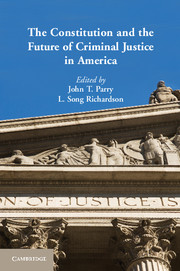Book contents
- Frontmatter
- Contents
- Contributors
- Acknowledgments
- Introduction
- Part I Foundations – The Scope of Criminal Law and Access to Counsel
- Part II Race and Criminal Procedure
- Part III Policing and Privacy
- Part IV Technology and the Surveillance Society
- Part V Confessions and miranda
- Part VI Conviction, Sentencing, and Incarceration
- Part VII Emergencies and Borders – Immigration, Terrorism, National Security, and Transnational Crime
- 14 Preemption and Proportionality in State and Local Crimmigration Law
- 15 Embattled Paradigms
- 16 The Civilianization of Military Jurisdiction
- 17 Crime across Borders
- Index
- References
14 - Preemption and Proportionality in State and Local Crimmigration Law
Published online by Cambridge University Press: 05 June 2014
- Frontmatter
- Contents
- Contributors
- Acknowledgments
- Introduction
- Part I Foundations – The Scope of Criminal Law and Access to Counsel
- Part II Race and Criminal Procedure
- Part III Policing and Privacy
- Part IV Technology and the Surveillance Society
- Part V Confessions and miranda
- Part VI Conviction, Sentencing, and Incarceration
- Part VII Emergencies and Borders – Immigration, Terrorism, National Security, and Transnational Crime
- 14 Preemption and Proportionality in State and Local Crimmigration Law
- 15 Embattled Paradigms
- 16 The Civilianization of Military Jurisdiction
- 17 Crime across Borders
- Index
- References
Summary
In October 2011, Mercedes-Benz announced a major expansion of its sprawling manufacturing plant in Tuscaloosa County, Alabama, forecasting a $350 million investment and the addition of hundreds of jobs to the forty-eight-hundred-strong workforce. A month later, a Tuscaloosa police officer stopped a rental car without a tag and asked the driver for his license. The driver handed the officer a foreign identity card but no driver’s license nor proof of lawful presence in the United States. The officer arrested the noncitizen driver and detained him pursuant to a state immigration law passed just months before. The driver turned out to be Detlev Hager, a German citizen and an executive with Mercedes-Benz.
Hager’s arrest galvanized public debate over state laws governing migration across and within their borders. Supporters and critics alike had deemed the Alabama law the harshest state immigration law in the nation. The Beason-Hammon Alabama Taxpayer and Citizen Protection Act gathered in a single piece of legislation the most severe elements of other state laws that had criminalized conduct related to immigration. It expanded police arrest and detention authority, made seeking unauthorized work a crime, criminalized “encouraging” unauthorized immigrants to enter the state, and required parents, under penalty of perjury, to report the citizenship status of their schoolchildren. Relevant to Hager’s case, the law provided that a noncitizen lacking federal authorization to be present in the United States committed a crime in Alabama by failing to carry a document evidencing lawful status.
- Type
- Chapter
- Information
- The Constitution and the Future of Criminal Justice in America , pp. 241 - 259Publisher: Cambridge University PressPrint publication year: 2013

